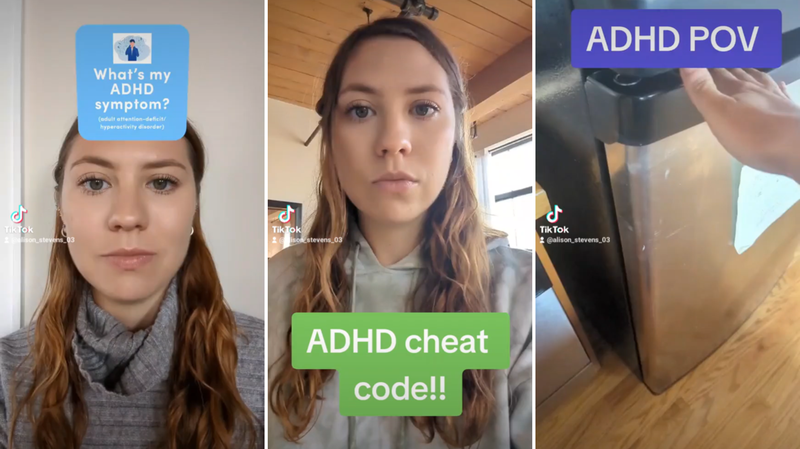Syracuse University psychologists conduct a study exploring how misinformation about ADHD spread through TikTok affects college-age individuals’ knowledge and perception of the disorder.
Key Takeaways:
- TikTok can be a source of information for college students, but it also has the potential to spread inaccuracies about health issues like ADHD.
- Exposure to ADHD misinformation reduces accurate knowledge while increasing confidence in false beliefs and interest in both valid and invalid treatments.
- Combating misleading content requires systemic solutions, including educational campaigns and support for content creators to share accurate, engaging information.

As TikTok becomes a go-to source of information for college students, a Syracuse University study warns that ADHD misinformation on the platform may distort understanding of the disorder.
TikTok is one of the fastest-growing and most popular social media platforms in the world – especially among college-age individuals. In the United States alone, there are over 136 million TikTok users aged 18 and older, with approximately 45 million falling within the college-age demographic. And college students aren’t just using the platform to watch viral videos. They’re also turning to it as a source of information, with around 40% of Americans using TikTok as a search engine.
While the app can be a valuable source of tips and how-to content, users should remain cautious and discerning, especially when it comes to health and safety information related to conditions like attention-deficit/hyperactivity disorder (ADHD), subjects about which misinformation can easily spread. To explore the impact of such factually incorrect content, researchers from the Department of Psychology at Syracuse University’s College of Arts and Sciences conducted a study examining how college-aged students respond to inaccurate ADHD-related content.
Their findings, published in the high-impact journal European Child & Adolescent Psychiatry, revealed that exposure to ADHD misinformation on TikTok significantly reduced students’ accurate understanding of the disorder. The study’s lead author, Ashley Schiros, a Ph.D. candidate in clinical psychology at Syracuse University, notes that this is concerning because such narratives could reshape public perceptions of ADHD in ways that do not align with established scientific knowledge.
“The dangers of ADHD misinformation spread via social media is that individuals may develop an inaccurate understanding of the signs, symptoms and treatments for ADHD,” notes Schiros, who co-authored the study with Kevin Antshel, professor of psychology at Syracuse University. “On one hand, misconceptions about ADHD may lead to individuals having less accurate knowledge about ADHD and may contribute to unwarranted treatment-seeking. On the other hand, belief that non-evidence-based treatments are an effective means of managing ADHD may lead to self-diagnosis or create barriers to evidence-based treatment-seeking.”
A TikTok Test
Schiros became interested in conducting the study after noticing a trend in clinical settings: many college students were seeking psychological assessments or therapy under the impression that they had ADHD—an impression often shaped by misinformation encountered online. The study aimed to explore how digital content about ADHD was influencing students’ interest in obtaining a diagnosis or pursuing treatment.
She and her co-authors developed an assessment in which approximately 500 Syracuse University students were randomly assigned to view TikTok posts featuring either accurate information about ADHD or factually incorrect content. The accurate content included slides with factual statements about ADHD symptoms, such as: 'often have trouble completing assignments on time,' 'difficulty remaining focused during lectures,' and 'frequently losing important items like your phone, keys, or water bottle.' In contrast, the misinformation slides presented inaccurate claims about ADHD symptoms, including: 'the urge to people please,' 'ADHD paralysis,' and 'a chronic feeling of being overwhelmed over the smallest tasks.'

For the study, Schiros created TikTok videos containing both accurate and inaccurate information about ADHD to investigate how such content influenced students’ perceptions of the disorder and their confidence in understanding it.
A baseline measure of ADHD knowledge was completed pre-content-viewing. Following content-viewing, participants completed measures assessing ADHD-related knowledge, stigma and treatment-seeking intentions.
Deciphering Real from Reel
Researchers found that participants exposed to ADHD misinformation demonstrated significantly lower accuracy in their ADHD knowledge, yet reported greater confidence in that knowledge after viewing the content. Notably, the misinformation group also expressed stronger intentions to seek both evidence-based and non-evidence-based treatments. Additionally, participants’ perception of the content as entertaining was significantly linked to both their ADHD knowledge and treatment-seeking intentions. Schiros notes that their findings suggest that the sharing of inaccurate TikTok content not only undermines factual understanding of ADHD but also fosters misplaced confidence and increased motivation to pursue treatment. And the implications of this work stretch beyond ADHD diagnoses.
“Although this study focused specifically on misinformation regarding ADHD online, there is a wide range of factually incorrect advice regarding various health and mental health topics on social media,” she says. “Consumers of online content are strongly encouraged to be aware of the prevalence of misinformation and learn tools to critically engage with and cross-verify the information they encounter online.”
Fact-Checking the Feed
So how can these changes be achieved? According to Schiros, addressing ADHD misinformation on social media is a complex challenge that likely requires systems-level interventions. She suggests that large institutions, such as medical centers and universities, can play a key role by launching social media campaigns that both pre-bunk and debunk common ADHD myths, while also sharing accurate and engaging content.
Additionally, Schiros highlights the potential for creator-focused interventions. Providing content creators with tools to improve the accuracy of their health-related posts and offering incentives for sharing evidence-based information could further help curb the spread of misinformation.
The team intends to conduct a follow-up study examining real-world exposure to ADHD misinformation by analyzing participants’ typical TikTok usage and its relationship to their knowledge of ADHD and intentions to seek treatment. The authors say future research is also needed to explore how online ADHD content influences stigma and to evaluate effective strategies for countering inaccurate information.
Citation: Schiros, A., Bowman, N. & Antshel, K. Misinformation mayhem: the effects of TikTok content on ADHD knowledge, stigma, and treatment-seeking intentions. Eur Child Adolesc Psychiatry (2025). https://doi.org/10.1007/s00787-025-02769-8
